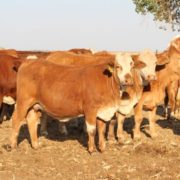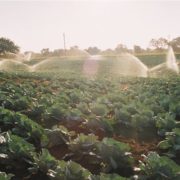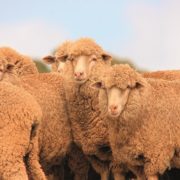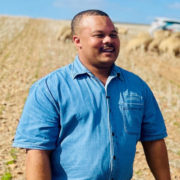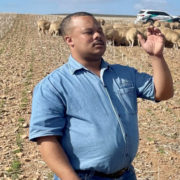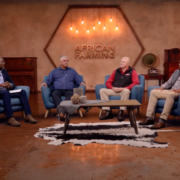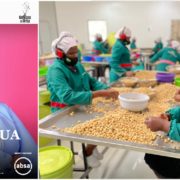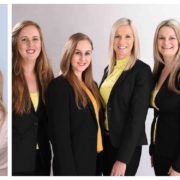Industry standards help farmers improve quality – African Farming
In the agricultural cropping and fresh-produce sector, industry standards act to guide planting and management of fields, orchards and vineyards. Standard compliance improves yields and quality, boosts profits and makes for a lucrative export trade in high-quality South African produce.
Praveen Dwarika, managing director at Lemang Agricultural Services, says South Africa’s heavily regulated farmers do a good job of complying with the rules. Although profitable farming drives the sector’s sustainability, he sees food safety as the primary responsibility of the producer. “There is no good reason for cutting corners when it comes to food safety, and this applies to responsible management of agrochemicals in particular,” he says.
Grain and oilseed farmers are subject to the Department of Agriculture’s grading regulations, which are implemented by inspectors and serve as a measure of quality for the grain industry. Grain is graded at the silo according to aspects such as colour, insect damage, fungal damage, foreign material content, kernel defects and chemical contamination levels. This standardisation ensures fair and competitive grain trading practices that benefit processors and consumers.
“There is a lot of easily accessed information on regulations in the grain sector, and our farmers are generally informed and compliant with the industry standards,” says Dwarika. South Africa’s grain complies with international grading standards.
Buyers at home and abroad want to buy safe, quality food and the standards for export-quality fresh produce are very high. Export market requirements are set out in various protocols and the exported produce is checked at various inspection points by government-mandated Perishable Produce Export Control Board (PPECB) officials.
Compliance with GlobalGap, a set of good agricultural practice standards evolved as a response to consumer interest in the impact of agriculture and agrochemical use on the environment and food safety, means more efficient use of resources, lower environmental impact and reduced use of agrochemicals. “Production standards are there to protect the consumer who has a right to safe, quality food,” says Dwarika.
To find out more, visit www.afgri.co.za/lemang-agricultural-services
Dasberg Farming – a land reform success story – African Farming
Gerswin Louw was the right man for commercial farmer Schalk Viljoen to bring in as a shareholder in Dasberg Farming, an agricultural transformation project in the Riviersonderend district of the Overberg. Livestock manager Gerswin has a solid background in sheep that he continuously grows while building his farming experience and his leadership skills. Gerswin says success in the agricultural world needs diligence, commitment and a lifelong passion for the job.
Overberg sheep farmer Gerswin Louw was born and raised in Merweville, a remote village in the central Karoo. Although the area around Merweville is home to mainly sheep farmers, Gerswin’s family did not farm. But for this small-town boy there was never any doubt that he would one day become a farmer.
As a pupil at Zwartberg High School in Prince Albert, he got involved with the school’s vegetable garden project, cultivating carrots and onions, and selling the seed to local nurseries. The school’s ostriches provided the animal contact.
During the holidays Gerswin worked on a farm that belonged to the father of a friend. Connected to the farming world and engaging with the land and the livestock only strengthened his determination to make agriculture his career.



A learning curve
Motivated by his dream to farm, Gerswin worked hard at school. His excellent matric results paid off when he earned a Mohair SA bursary to study at Grootfontein Agriculture College in Middelburg, Cape. Later he was to discover that his mentor and partner-to-be, Schalk Viljoen, had also studied at Grootfontein.
Gerswin completed the three-year diploma specialising in small stock and cattle. As part of his bursary obligation after graduation, he worked for three years at Cape Mohair and Wool as a wool appraiser and a junior auctioneer. Then he completed the National Certificate in New Venture Creation NQF4 leadership qualification, introduced as part of the PALS (Partners in Agri Land Solutions) project.
PALS is a private land reform and development initiative originally established by Ceres farmers partnering with local communities and government. PALS was developed with the vision to grow an inclusive and sustainable agricultural economy, to create jobs and to encourage social harmony in communities.
The key objective of the PALS initiative is to create the right kind of environment to implement successful land reform projects and to empower black farmers. The PALS land reform models aim to be replicable across all agricultural commodities.
In 2014, when Gerswin was working at improving his capacity in the livestock arena, Schalk was looking into land reform initiatives. Schalk had a heart for transformation that gave title to black farmers. His own father had spent his life farming for others and Schalk knew the value of land ownership in farming. While attending the Land Indaba of the Western Cape’s Department of Agriculture he met Gerrit van Vuuren, a founder member of PALS.
At that stage PALS was testing its land reform model on two Ceres farms. A look at how those operations were working convinced Schalk of the way forward. The PALS framework offered a practical model for Schalk’s drive to implement his land reform project, one in which he aimed to partner and share with his employees in a commercial, large-scale business enterprise.


The process of transformation
In 2015 Dasberg Farming was registered as a company with 49% of the shares owned by Schalk Viljoen Farming and 51% owned by Kipara Farming, a 100% black-owned company with three black managers and a personnel trust (in which permanent workers are the beneficiaries) as the shareholders.
This was the start of Schalk’s development project becoming a reality, partly because of the relevant input and workable models of land reform demonstrated by PALS, and partly because of good mentorship and the relationships of trust formed between the black and white farmers in the partnership.
The first three years of the Dasberg transformation project were tough. There were some major challenges involved in sorting out the capital gains tax (which would have been levied on the farm that Schalk wanted to transfer to Dasberg), assessing the environmental impacts, finding the finance for the new farm and getting the hectares scheduled for irrigation. Finally, in September 2018, the admin work was done and the irrigation rights secured.
Then came the physical work of building a dam, with a 20m high wall, that inundated 9ha of land. The dam building was done in four months and on 21 February 2019, the 631ha farm, Van der Wattskraal near Riviersonderend, was registered as the land asset of Dasberg Farming.
Schalk Viljoen Farming now owns 41% of the shares in Dasberg. The three shareholders in Eksteenkloof own a 51% share in Dasberg and the remaining shares are owned by the workers. Gerswin, a shareholding manager, runs the livestock project and manages between 8 000 and 15 000 merino sheep. Kipara farming also grows small grains (wheat, barley, canola and oats) in rotation, and produces citrus under shade netting.



Production, marketing and planning
The agricultural landscape is known to be demanding and often difficult and Gerswin will testify to this. The wool market is volatile as prices ride on the fluctuating rand. Global events can have a significant impact on profitability and producers have felt the effects of the Russian invasion of the Ukraine through increased fuel, fertiliser and feed costs.
Drought is another problem in the Overberg region. Gerswin has been in the area for seven years and has lived through very difficult times as dry weather continues for season after season and the drought tightens its grip on farmers who must rely on rain. In dry periods much of Gerswin’s focus is on feeding and watering the animals. In winter the sheep graze canola residue underplanted with lucerne and are fed a lick and maize every second day.
When the animals are on green lucerne pastures redgut can be a problem but Gerswin controls it by putting out salt licks and hay. This reduces animal intakes of the high-quality lucerne pasture and keeps redgut at bay.
Mature sheep are shorn every eight months, and lambs every four to six months.
Access to the market is via OVK in Port Elizabeth. OVK officials classify the wool on the farm and the company sells the wool at national auctions. Gerswin and his team produce mainly very fine, high-quality (18 micron) wool for the export market. They also sell some of their lambs and older ewes for meat. These animals are sold and driven directly to the abattoir.


Forward thinking
Hard work and a sound transformation model turned the dream of a land reform project into a concrete, successful agri-business but Gerswin says the dream must not stop here. In the future, he plans on an expanded breeding programme and more animals to supply his own on-farm auctions where Dasberg’s lambs and breeding rams could be sold.
He has not managed to convince the other shareholders of the financial benefits and wisdom of this project yet but Gerswin plays the long game and has the patience and the vision to see things through.
He clearly loves his job and believes that the farmer who takes good care of his people and his animals will go far.
Up close and personal with Gerswin Louw – African Farming
What is the best advice you’ve ever been given?
To make every opportunity one to remember and to give it your best shot.
Is there anything you would have done differently if you had the choice?
At this stage it’s difficult to say because I’ve achieved so much of what I dreamt about for so long.
What has been your biggest achievement to date?
I am proud of having produced top quality wool for our market.
Who has made the biggest contribution to your success so far?
My mentor, Schalk Viljoen, my family and the people I work with.
What is your relationship like with your neighbours and what role have they played in your business?
I have a great and open relationship with my neighbours. If any of us needs help we are all there for one another.
Was it a struggle to secure financing? Do you have any advice for emerging farmers who need funding?
Make sure you have a good business plan and model. Make sure you have the right mentors and partners who can help you make the best decisions.
How important is the role of input suppliers in your business?
They play a big role in our company in making the right decision on the products you produce and on the right time to deliver it.
If you had the chance to offer the minister of agriculture some advice, what would it be?
Be there for your farmers and help them with financing so that we can grow the agriculture sector to a better place. Improve our roads that cause so many problems. And create more opportunities for our young farmers.
Here’s what you can expect in African Farming this week! – African Farming
In our final episode of African Farming season three, host Tony Ndoro spends time with cattle, goat and sheep farmer Thabo Dithakgwe and our panel experts discuss the future of farming. Tune in this Thursday at 19:00 on Mzansi Wethu, DStv channel 163.
Compliance with industry regulations and standards in agriculture – African Farming
African Farming presenter Tony Ndoro discusses compliance with industry regulations and standards across the value chain with industry experts, Ratselane Marumo of Afrivet, Allan Sinclair of Vleissentraal Bloemfontein and MD of Afgri’s Lemang Agricultural Services, Praveen Dwarika.
Jane Maigua, Kenya’s macadamia nut agri-processing pioneer — Lionesses of Africa

Lioness Weekender spoke to founder, Jane Maigua, to understand more about her entrepreneurial journey, and what drives her to make a difference both in terms of the environment and to job creation for women and youth.
What does your company do?
We source macadamia nuts in shells from thousands of smallholder farmers, processing and exporting raw macadamia kernels into international markets through a B2B model.
What inspired you to start your company?
The struggles that I saw with farmers not getting value for their crop as middlemen exploited them through very own pricing. My parents were peasant farmers facing such struggles as well. I was also aspired to run an export business that would also create opportunities for many people, and to inspire other women to run corporate businesses.
Why should anyone use your service or product?
High production standards under high level and stringent food safety systems. We have FSSC 22000 Certification, ISO 9001 certification and Kosher certification all of which enable us to assure our customer of high quality and safe food product from Exotic. We have a high customer orientation, and to achieve this we ensure that our staff operate in an environment and culture that fosters respect, teamwork, diligence, integrity, innovation, and high quality standards.
Tell us a little about your team
Our team comprises of 29 full time workers and 68 temporary workers.
The management team comprises of a dynamic and talented team of 8, five being women. They all are highly qualified and experienced in their respective roles and are always highly motivated to deliver our customer promise. We do have a lot of fun working together and have several social activities such as team building events, celebration of everyone’s birthday, graduations, baby showers etc. as the case maybe.
Share a little about your entrepreneurial journey. And do you come from an entrepreneurial background?
My mother was a peasant farmer and ran a few Agri based businesses while my father was a bus driver. I saw them struggle with the farm activities but at the same time educated my two siblings and I from the same. I aspired to be an astute entrepreneur at one time in my life but like everyone else I had to go through education and the eminent path. I ended up in entrepreneurship development sector working with national and international NGOs as well as the UN on projects that supported Small and Medium Enterprises to start and grow their businesses. From this I gained a lot of knowledge and motivation to still pursue my dream of starting a business. 25 years into my career I resigned from the UN to start the Agro processing and export of nuts, which I have done with my partners for the last four years. It is challenging and exciting at the same time.
What are your future plans and aspirations for your company?
Future plans are to expand our operations to include macadamia oils and other specialty oils such as sesame, moringa and baobab. We also plan to get into roasted nuts which we can supply domestic markets as well as the wider African market. We also hope to build our own factory that will scale up our production form the 2,500MT nuts in shell we currently are processing annually to 5,000MT annually.
What gives you the most satisfaction being an entrepreneur?
Having satisfied customers with our nuts and on the other hand seeing women and men having a consistent source of decent income at the factory and value chain, including our small scale farmers and suppliers.
What’s the biggest piece of advice you can give to other women looking to start-up?
You can go as high as you dream or even higher, so set your ambitions high. Seek to overcome the societal or cultural perceptions as well as self-limitation and go for gold! It is possible to excel as a woman. Put in the work and enjoy the results.
To learn more about Jane’s entrepreneurial journey and her business, Exotic EPZ, contact her via email: jane@exoticepz.co.ke and visit the company’s website and social media platforms:
Sasha Knott, a South African techpreneur building an innovative recruitment solution connecting companies to talent — Lionesses of Africa

What inspired you to start your company?
We wanted to make a difference and found that with helping SMEs hire we could make a dent in unemployment.
Why should anyone use your service or product?
We focus on SMEs and helping them hire fast while being cost effective as we know all about cash flow!
Tell us a little about your team
Our team are 23-women led, with a wealth of experience in Recruitment, IT, Customer Service and Finance. We all work virtually from our homes, to ensure we can multi-task between clients, candidates, crew and our children! Sasha and Kelly work with the team to ensure our vision is reached of making a dent in unemployment. We are all extremely passionate about what we do and the way we do it!
Share a little about your entrepreneurial journey. And do you come from an entrepreneurial background?
Having begun my career as a System Administrator then moving into a Computer Programming role, it gave me the foresight and understanding into the tech-era. Having run a large IT Support Centre in Cape Town I further grew my entrepreneurial leadership skills in the tech sector, being headhunted to start the Operations & IT Centre for the Virgin Group.
In April 2010, I successfully moved to the financial services industry. I started an online trading business (iTRADEpro), sold the business and then became the General Manager for Como Capital; a holding company that invests in credit financial services businesses with a high potential to solve industry problems or disrupt inefficient markets. I then entered the Insurance industry, first into Africa and then later started Switch2, a credit life insurance business, which was recently sold to Clientele Life. Switch2’s focus is to save consumers money in their credit life insurance.
Umutoni Thuku-Benzinge, a luxury jewellery brand builder changing the lives of Kenya’s artisans — Lionesses of Africa

What inspired you to start your company?
Being British born and of both Kenyan and Rwandan heritage, I’ve always had a very strong affinity with my East African roots and had a desire to amalgamate all my worlds while giving back in a sustainable way. In addition, I used to sell jewellery when I was 15 years old to friends, family members, and at various events after some of my most memorable summer holidays in Kenya. I remember making £100 profit from sales in one day which was very exciting. At the time, however, my teen priorities had me put my social life ahead of any business development.
My observation of creative industries taking their inspiration from the African continent. Examples spanning from high fashion runways, such as Ozwald Boateng’s Africanism line, to Hollywood costume designs in films such as Black Panther, I realized there is a global demand for African design and I am well equipped to be a part of the movement. These realizations coupled with the social impact potential gave me the confidence to take the leap of faith and venture out into a world I dabbled with briefly as a teenager. Ultimately, my inspiration comes from the vast array of creative talent I see in Kenya every year coupled with my desire for societal change amongst communities that are often overlooked.
Why should anyone use your service or product?
Our mission is and always will be:
-
To empower the disenfranchised.
-
Promote a spirit of reciprocity.
-
Cultivate a culture of equitable exchange.
Our handmade, gold plated jewelry are forged with love by the very best artisans from the heart of Kenya.
The artisans making our pieces are youth from disadvantaged backgrounds, hoping to turn their lives around, developing new skills that will keep them away from the biggest threats to young men and women in slum areas – the prospects of a life of crime. Currently, we work with artisans in two slums; Kibera, the largest urban slum on the African continent and forth largest in the world as well as Baba Dogo, located on the fringes of Nairobi. Through their skill and care we are able to ensure quality and also meet the personal desires and requirements of our customers.
By purchasing our jewelry, you are not just buying an aesthetically pleasing piece, you are supporting the dreams of those artisans that dare to change the cards life has dealt them and in turn their family’s future.

